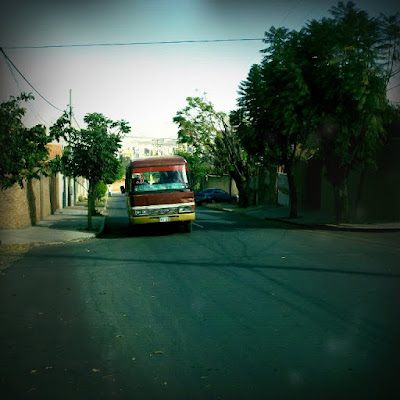1 July 2011I've made a friend. A little girl wearing a purple jacket is reaching for my hand so that I may give her more Pringles. Her mom is telling her to come inside to eat.
So yesterday we took a bus and then a train and arrived in Uyuni last night. I thought Bolivians exaggerate the cold, but after being here, I realize that they weren't overemphasizing the the frigid weather of the Salar. The temperature on the train dropped significantly as were coming upon the town. Luckily, Pepe's mom lent me a huge, insulated, rapper-style jacket.
When we got to the town the four of us plopped our backpacks in our hostel rooms and headed out in search for a bar. The town was deserted. Imagine the movie "Silent Hill." Okay. Good. We walked around until we saw this colored discoball outside of a doorway. We walked in and sat down next to the propane heater. We were the only ones at the bar and shared a Huari together. That night was freezing. Either from my cold or the altitude or the cold, I woke up a few times gasping for air. I decided then that I wasn't going to change my clothes. (I slept in the same outfit for days.) In the morning we found some alpaca legwarmers, gloves, and a sweater. Afterward, we (along with a Brit and 2 Brazilians) squeezed into the Toyota SUV and drove to the salt hotel, the salt flats, artisan stores, until finally making it here.
It's been somewhat a fantasy of mine to be among llamas and wild alpaca...and here I am! This hostel has a stone-fence enclosing a handful of llamas. Not knowing what to do until dinner, we took out our cameras and walked around the hostel. You can see "wild" (or unreleased) animals - donkeys, llamas, and there are also flamingos and small birds. After Ana and I took some shots of randomly placed llama carcasses, I began exploring alone. This "town" (maybe 6 houses? a church?) has these stone-walls all over the place. At first, the walls didn't appear to have a specific layout, but after entering more and more rectangles I realized that I was lost in some planned out property maze. I guess this trip has been my closest experience with actually living in a "third-world" country. The houses here are made out of mud and those that have been abandoned still show the previous tenants' presence: rusty cans, bones, feathers, and remnants of pottery. I couldn't imagine living in this cold like this longer than a few days. Bolivia certainly has many, many contrasts.
Well now that the group has returned back to the hostel, I can give the little girl's mom her pen back and see what's next on the agenda.
ciao!


















